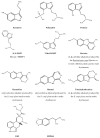Psychedelics: Alternative and Potential Therapeutic Options for Treating Mood and Anxiety Disorders
- PMID: 35458717
- PMCID: PMC9025549
- DOI: 10.3390/molecules27082520
Psychedelics: Alternative and Potential Therapeutic Options for Treating Mood and Anxiety Disorders
Abstract
The word "psychedelic" (psyche (i.e., the mind or soul) and delos (i.e., to show)) has Greek origin and was first coined by psychiatrist Humphry Osmond in 1956, who had been conducting research on lysergic acid diethylamide (LSD) at the time. Psychedelic drugs such as N,N-DMT/DMT (N,N-dimethyltryptamine), 5-MeO-DMT (5-methoxy-N,N-dimethyltryptamine), LSD (lysergic acid diethylamide), MDMA (3,4-methylenedioxymethamphetamine) and psilocybin have had significant value as an entheogen in spiritual, religious (shamanic) and sociocultural rituals in Central and South American cultures for thousands of years. In the 1960s, the globalization of these drugs and their subsequent spread outside of their indigenous, old-world cultures, led to the subsequent implementation of strict drug control laws in many Western countries. Even today, psychedelics are still classified as Schedule I drugs, resulting in a still lingering negative stigmatization/perception, vilification, and ultimate criminalization of psychedelics. This controversy still lingers and still limits scientific research and full medical acceptance. For many years up until recently, the spiritual, religious and medicinal value of these drugs could not be explored in a scientific context. More recently, a second wave of psychedelic research is now focusing on psychedelics as neuropharmaceuticals to treat alcohol and tobacco addiction, general mood and anxiety disorders and cancer-related depression. There is now a vast array of promising evidence-based data to confirm the years of anecdotal evidence of the medicinal values of psychedelics. Natural therapeutic alternatives such as psychedelic drugs may provide a safe and efficacious alternate to conventional drugs used to treat mood and anxiety disorders. In a Western context in particular, psychedelic drugs as therapeutic agents for mood and anxiety disorders are becoming increasingly of interest amidst increasing rates of such disorders globally, changing social constructions, the implementation of government regulations and increasing investment opportunities, that ultimately allow for the scientific study to generate evidenced-based data. Alternative psychotherapeutic interventions are gaining interest also, because of their low physiological toxicity, relatively low abuse potential, safe psychological effects, and no associated persisting adverse physiological or psychological effects during and after use. On the other hand, conventional psychotic drugs and anti-depressants are becoming less favorable because of their adverse side effects. Psychedelic neuropharmaceutical interventions may with medical oversight be the solution to conventional psychiatric disorders such as depression and anxiety, and an alternative to conventional psychiatric treatment options. This paper will review the therapeutic potential of psychedelic drugs as alternative therapeutic options for mood and anxiety disorders in a controlled, clinical setting, where the chances of adverse psychological episodes occurring are mitigated.
Keywords: addiction; anxiety; cancer; depression; neuropharmaceuticals; neurotherapeutics; psilocybin; psychedelic; psychopharmacology.
Conflict of interest statement
The authors declare no conflict of interest.
Figures


Similar articles
-
The changing outlook of psychedelic drugs: The importance of risk assessment and occupational exposure limits.J Appl Toxicol. 2024 Feb;44(2):216-234. doi: 10.1002/jat.4533. Epub 2023 Aug 30. J Appl Toxicol. 2024. PMID: 37646119
-
Psychedelics and Psychedelic-Assisted Psychotherapy.Am J Psychiatry. 2020 May 1;177(5):391-410. doi: 10.1176/appi.ajp.2019.19010035. Epub 2020 Feb 26. Am J Psychiatry. 2020. PMID: 32098487 Review.
-
Psychedelics: From Cave Art to 21st-Century Medicine for Addiction.Eur Addict Res. 2024;30(5):302-320. doi: 10.1159/000540062. Epub 2024 Sep 25. Eur Addict Res. 2024. PMID: 39321788 Free PMC article. Review.
-
The Psychedelic Future of Post-Traumatic Stress Disorder Treatment.Curr Neuropharmacol. 2024;22(4):636-735. doi: 10.2174/1570159X22666231027111147. Curr Neuropharmacol. 2024. PMID: 38284341 Free PMC article. Review.
-
The use of classic psychedelics among adults: a Danish online survey study.Nord J Psychiatry. 2023 May;77(4):367-378. doi: 10.1080/08039488.2022.2125069. Epub 2022 Sep 29. Nord J Psychiatry. 2023. PMID: 36173202
Cited by
-
Psilocybin and the glutamatergic pathway: implications for the treatment of neuropsychiatric diseases.Pharmacol Rep. 2024 Oct 16. doi: 10.1007/s43440-024-00660-y. Online ahead of print. Pharmacol Rep. 2024. PMID: 39412581 Review.
-
Short-term safety and tolerability profile of 5-methoxy-N,N-dimethyltryptamine in human subjects: a systematic review of clinical trials.Front Psychiatry. 2024 Sep 19;15:1477996. doi: 10.3389/fpsyt.2024.1477996. eCollection 2024. Front Psychiatry. 2024. PMID: 39364380 Free PMC article.
-
5-Methoxy-2-aminoindane Reverses Diet-Induced Obesity and Improves Metabolic Parameters in Mice: A Potential New Class of Antiobesity Therapeutics.ACS Pharmacol Transl Sci. 2024 Jul 30;7(8):2527-2543. doi: 10.1021/acsptsci.4c00353. eCollection 2024 Aug 9. ACS Pharmacol Transl Sci. 2024. PMID: 39144560
-
Behavior, antioxidant, and metabolomics effects of Allium tuncelianum.Food Sci Nutr. 2024 Feb 22;12(5):3538-3551. doi: 10.1002/fsn3.4022. eCollection 2024 May. Food Sci Nutr. 2024. PMID: 38726412 Free PMC article.
-
Safety, tolerability, pharmacodynamic and wellbeing effects of SPL026 (dimethyltryptamine fumarate) in healthy participants: a randomized, placebo-controlled phase 1 trial.Front Psychiatry. 2024 Jan 11;14:1305796. doi: 10.3389/fpsyt.2023.1305796. eCollection 2023. Front Psychiatry. 2024. PMID: 38274414 Free PMC article.
References
-
- Kelley A. Americans are Taking More Anti-Anxiety Medication and Antidepressants during CORONAVIRUS Pandemic: Report. Apr 16, 2020. [(accessed on 18 February 2021)]. Available online: https://thehill.com/changing-america/well-being/mental-health/493125-inc....
-
- Harvard Health Publishing What Are the Real Risks of Antidepressants? Mar, 2014. [(accessed on 18 February 2021)]. Available online: https://www.health.harvard.edu/mind-and-mood/what-are-the-real-risks-of-....
-
- Mayo Clinic Staff The Most Commonly Prescribed Type of Antidepressant. Sep 17, 2019. [(accessed on 18 February 2021)]. Available online: https://www.mayoclinic.org/diseases-conditions/depression/in-depth/ssris....
Publication types
MeSH terms
Substances
LinkOut - more resources
Full Text Sources
Medical

